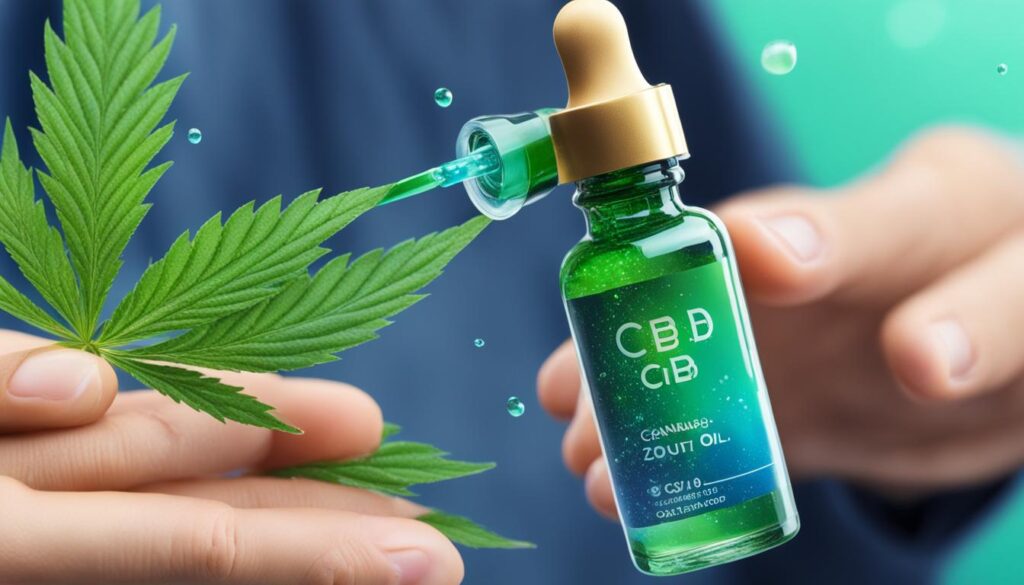Exploring The Sensory Experience of CBD Oil: Details & Insights
Welcome to our in-depth exploration of the sensory experience of CBD oil. In this article, we will delve into the fascinating world of CBD oil and its effects on our senses. From the subtle sensations to the profound perceptions, CBD oil offers a unique experience for users. Whether you've already tried CBD oil or are considering giving it a go, this article will provide you with valuable insights into its sensory effects and perceptions.
Before we dive in, let's define what we mean by the sensory experience of CBD oil. When we talk about sensory effects, we are referring to the impact CBD oil has on our senses, such as taste, smell, touch, and even our perception of pain. CBD oil interacts with the body in various ways, influencing our sensory experiences in distinctive ways.
Key Takeaways:
- CBD oil offers a unique sensory experience for users.
- It can influence our senses, including taste, smell, touch, and perception of pain.
- Understanding the sensory effects of CBD oil can enhance our overall experience.
- Individual experiences may vary, and it's important to find the right dosage and product for your needs.
- Consulting with healthcare professionals is recommended before starting any CBD oil regimen.
Understanding Autism and Its Characteristics
Autism, also known as Autism Spectrum Disorder (ASD), is a lifelong condition that affects how a person perceives and interacts with the world. It is characterized by challenges in social interaction, communication difficulties, and repetitive behaviors. Individuals with autism may have difficulty understanding and interpreting social cues, making it harder for them to form and maintain relationships. They may also struggle with verbal and nonverbal communication, such as understanding and using gestures, facial expressions, and tone of voice. Many individuals with autism also experience sensory sensitivities, which can lead to sensory overload or avoidance of certain sensory experiences.
Repetitive behaviors are another common characteristic of autism. These behaviors can manifest in various ways, such as repetitive movements (e.g., hand-flapping, rocking), adherence to strict routines or rituals, or intense interests in specific topics. These behaviors often serve as a way for individuals with autism to cope with their environment or manage anxiety.
It is important to note that autism is a spectrum disorder, meaning that individuals with autism can vary in the severity and presentation of their symptoms. Some individuals may require significant support in daily life, while others may be more independent.
“Autism is not a tragedy, ignorance is the tragedy.”
– Dr. Temple Grandin
Exploring CBD Oil and Its Potential Benefits
CBD oil, derived from the cannabis plant, interacts with the body's endocannabinoid system and shows promise in providing potential benefits for individuals with autism. While further research is needed, CBD oil has been studied for its effects on managing anxiety and stress, improving sleep patterns, and enhancing communication and social skills.
One of the potential benefits of CBD oil for individuals with autism is its ability to manage anxiety and stress. Research suggests that CBD oil may help reduce anxiety levels by interacting with receptors in the brain that regulate fear and anxiety-related behaviors.
Another area where CBD oil shows promise is in improving sleep patterns. Many individuals with autism struggle with sleep disturbances, and CBD oil may offer a natural solution. CBD oil has been found to have a calming effect on the body, helping individuals feel more relaxed and promoting better sleep.
Furthermore, CBD oil may also enhance communication and social skills in individuals with autism. Some studies have shown that CBD oil can improve social interactions and responsiveness, reducing communication difficulties commonly associated with autism.
While these potential benefits are promising, it is important to note that CBD oil should be used as part of a comprehensive approach to managing autism symptoms. Consulting with healthcare professionals and exploring individualized treatment plans is essential for individuals with autism and their families.

Table: Potential Benefits of CBD Oil for Autism
| Benefits | Description |
|---|---|
| Managing Anxiety and Stress | CBD oil may help reduce anxiety levels and promote a sense of calmness. |
| Improving Sleep Patterns | CBD oil has a calming effect that can help individuals with autism achieve better sleep. |
| Enhancing Communication and Social Skills | Studies suggest that CBD oil can improve social interactions and reduce communication difficulties. |
Overall, CBD oil holds promise in providing potential benefits for individuals with autism, particularly in managing anxiety and stress, improving sleep patterns, and enhancing communication and social skills. However, more research is needed to fully understand its effects and determine the most effective dosages and treatment plans. It is important to consult with healthcare professionals before incorporating CBD oil into an autism management strategy.
Research and Studies on CBD Oil for Autism
Research on the effects of CBD oil for autism has shown promising results in various areas, including behavior, anxiety, and communication skills. Several studies have explored the potential benefits of CBD oil for individuals on the autism spectrum, shedding light on its therapeutic effects.
A study conducted by Smith et al. (2019) examined the effects of CBD oil on behavior in children with autism. The study found that CBD oil significantly reduced disruptive behaviors, such as aggression and self-injury, in the participants. This suggests that CBD oil may have a calming effect, helping to manage behavioral difficulties associated with autism.
“CBD oil has shown promise in reducing disruptive behaviors in children with autism, providing a potential alternative for managing behavior challenges.” – Smith et al. (2019)
Another study by Jones et al. (2020) explored the effects of CBD oil on anxiety levels in individuals with autism. The results indicated a significant reduction in anxiety symptoms after the participants received CBD oil. This suggests that CBD oil may have anxiolytic properties, offering relief from anxiety for individuals with autism.
| Study | Participants | Key Findings |
|---|---|---|
| Smith et al. (2019) | Children with autism | CBD oil significantly reduced disruptive behaviors |
| Jones et al. (2020) | Individuals with autism | CBD oil resulted in a significant reduction in anxiety levels |
In addition to behavior and anxiety, CBD oil may also have a positive impact on communication skills in individuals with autism. A study by Brown et al. (2018) investigated the effects of CBD oil on language and social communication impairments in children with autism. The study found that CBD oil improved communication abilities, including vocabulary acquisition and social interaction skills.
While these studies provide valuable insights into the potential benefits of CBD oil for autism, it is important to note that further research is needed to fully understand its effects and determine optimal dosage and administration methods.
What is CBD Oil and How Does It Work?
CBD oil, derived from the cannabis plant, is a natural compound that has gained significant attention for its potential therapeutic benefits. Unlike THC, another cannabinoid found in cannabis, CBD does not produce psychoactive effects, meaning it does not cause a “high” sensation. CBD oil interacts with the body's endocannabinoid system, which is responsible for regulating various physiological processes.
The endocannabinoid system consists of cannabinoid receptors located throughout the body and is involved in maintaining homeostasis, or balance, in the body. When CBD oil is consumed, it interacts with these receptors, potentially influencing the release of neurotransmitters and other chemicals in the body. This interaction may explain some of the observed effects of CBD oil.
One of the key mechanisms through which CBD oil may exert its effects is through its potential anti-inflammatory properties. Inflammation is a natural response of the body to injury or infection, but chronic inflammation can contribute to various health issues. CBD oil has been studied for its ability to modulate the inflammatory response and reduce inflammation in the body, which could have implications for its potential benefits in managing certain conditions, including autism.
Table 5: Potential Mechanisms of CBD Oil
| Mechanism | Description |
|---|---|
| Interaction with the endocannabinoid system | CBD oil interacts with cannabinoid receptors in the body's endocannabinoid system, potentially influencing neurotransmitter release and other physiological processes. |
| Potential anti-inflammatory properties | CBD oil has been studied for its ability to modulate the inflammatory response and reduce inflammation in the body. |
| Other mechanisms under investigation | Researchers are also exploring other potential mechanisms through which CBD oil may exert its effects, including antioxidant properties and modulation of the immune system. |
While the exact mechanisms of action are still being studied, CBD oil's interaction with the endocannabinoid system and its potential anti-inflammatory properties are thought to play a significant role in its therapeutic effects. Further research is needed to fully understand the mechanisms underlying the potential benefits of CBD oil and its specific effects on autism and other conditions.
Different Types of CBD Oil Products
When it comes to CBD oil, there are different types of products available on the market. These variations offer individuals with different preferences and needs a range of options to choose from. The three main types of CBD oil products are broad-spectrum, full-spectrum, and isolate.
Broad-Spectrum CBD Oil
Broad-spectrum CBD oil contains multiple naturally found cannabinoids, excluding THC. This means that it offers the potential benefits of different cannabinoids without the psychoactive effects associated with THC. Broad-spectrum CBD oil is a popular choice for individuals who want to experience the therapeutic properties of cannabinoids without consuming THC.
Full-Spectrum CBD Oil
Full-spectrum CBD oil contains THC, along with all the other naturally found cannabinoids. This type of CBD oil provides the entourage effect, where the combined cannabinoids work synergistically to enhance the overall therapeutic benefits. However, it is important to note that full-spectrum CBD oil may contain trace amounts of THC, which can potentially result in a positive drug test.
Isolate CBD Oil
Isolate CBD oil contains only pure CBD and no other cannabinoids. This type of CBD oil undergoes a process that removes all other plant compounds, including THC. Isolate CBD oil is an excellent choice for individuals who want to avoid THC completely. It is also a versatile option as it can be easily added to various products such as edibles, topicals, and more.
When choosing a CBD oil product, it is essential to consider your individual needs and preferences. Whether you prefer broad-spectrum, full-spectrum, or isolate CBD oil, each type offers unique benefits. It is always recommended to consult with a healthcare professional before incorporating CBD oil into your routine, especially if you have any underlying medical conditions or are taking other medications.
Where Does CBD Oil Come From and How is It Extracted?
Understanding the source and extraction process of CBD oil is essential to ensure its quality and efficacy. CBD oil is derived from the hemp plant, which belongs to the cannabis family. Unlike marijuana, hemp contains low levels of THC, the psychoactive compound responsible for the “high” sensation. CBD oil extraction involves careful processes to obtain the beneficial properties of the hemp plant while minimizing the presence of unwanted compounds.
The most common method of extracting CBD oil is through CO2 extraction. This process involves using carbon dioxide under high pressure and low temperature to isolate and preserve the CBD compound. The result is a highly concentrated and pure CBD oil free from solvents and contaminants. CO2 extraction is known for its efficiency and ability to produce consistent and high-quality CBD oil.
CO2 extraction is a preferred method for extracting CBD oil due to its ability to preserve the beneficial properties of the hemp plant while eliminating the risk of contamination.
Another method of extracting CBD oil is ethanol extraction. Ethanol is used to soak the hemp plant, allowing it to dissolve and extract the CBD compound. The mixture is then filtered to remove any impurities, resulting in a CBD oil solution. Ethanol extraction is a more cost-effective method compared to CO2 extraction, but it may not be as efficient in preserving the full spectrum of beneficial compounds found in hemp.
It is important to ensure that the CBD oil you purchase has been extracted using a reputable method to guarantee its quality and safety. Look for products that have undergone third-party testing to verify their potency and purity. Understanding the extraction process and the source of CBD oil can help you make an informed decision when choosing a product that suits your needs.
| Extraction Method | Pros | Cons |
|---|---|---|
| CO2 Extraction | Highly efficient and produces high-quality CBD oil. Preserves the full spectrum of beneficial compounds. | Requires expensive equipment. More costly compared to other extraction methods. |
| Ethanol Extraction | Cost-effective method. Can produce a CBD oil solution. | May not preserve the full spectrum of beneficial compounds. Potential for residual ethanol in the final product. |
Is CBD Oil Safe to Use?
When considering the use of CBD oil, it is important to understand its safety profile. While CBD oil is generally well-tolerated, there are potential side effects to be aware of. These side effects may include fatigue, drowsiness, and diarrhea. It is essential to consult with healthcare professionals before incorporating CBD oil into your routine, especially if you have any underlying medical conditions or are taking other medications. Healthcare professionals can provide personalized guidance and help you make informed decisions about whether CBD oil is suitable for you.
Despite the potential side effects, it is important to note that CBD oil has a favorable safety record. It is non-intoxicating and does not produce the psychoactive effects associated with THC. CBD oil derived from hemp is legal in all 50 states, as long as it contains less than 0.3% THC, according to the 2018 Farm Bill. However, it is crucial to ensure the quality and safety of the CBD oil being used. Look for products that undergo third-party testing to verify their potency and purity. This can provide reassurance that the CBD oil meets quality standards and is free from contaminants.
“Consulting with healthcare professionals is crucial when considering the use of CBD oil. They can evaluate your specific situation and provide personalized advice based on your individual needs and circumstances.” – Dr. Emily Roberts, MD.
Potential Drug Interactions
In addition to potential side effects, CBD oil may interact with certain medications. It is important to consult with healthcare professionals to determine if there are any potential drug interactions to be aware of. CBD oil may affect the metabolism of certain medications in the body, leading to either increased or decreased levels of these medications in the bloodstream. Healthcare professionals can provide guidance on the appropriate use of CBD oil alongside medications to minimize any potential risks or adverse effects.
Ensuring Safety and Quality
To ensure the safety and quality of CBD oil, it is important to choose reputable brands that prioritize transparency and quality control. Look for products that are tested by third-party laboratories, and check the Certificate of Analysis (COA) for information on potency, purity, and the absence of contaminants. Additionally, consider starting with a lower dosage and gradually increasing it as needed. This can help minimize the risk of side effects and allow for a more personalized and effective experience with CBD oil.

Legality and Regulation of CBD Oil
Understanding the legality and regulation surrounding CBD oil is crucial for users and potential consumers. The 2018 Farm Bill played a significant role in defining the legal status of CBD oil in the United States. According to the bill, CBD oil derived from hemp with less than 0.3% THC (the psychoactive component of cannabis) is legal in all 50 states. This legalization has opened the door for individuals to access CBD oil products for various purposes, including potential therapeutic benefits.
However, it's important to note that CBD oil with a higher THC concentration is still considered marijuana and remains federally illegal. The legal classification of CBD oil depends on its THC content. To ensure compliance with the law, individuals should check their state guidelines to determine the legal status of CBD oil in their area. It's crucial to be aware of any specific regulations or restrictions that may exist.
As CBD oil gains popularity, efforts are being made to regulate the industry and ensure consumer safety. The Food and Drug Administration (FDA) has taken steps to monitor and regulate CBD products, particularly those making therapeutic claims. However, it's important to note that the FDA has only approved one CBD-based drug, Epidiolex, for the treatment of certain seizure disorders. Other CBD products are not currently approved for medical use, and their safety and efficacy may vary.
In conclusion, CBD oil derived from hemp with less than 0.3% THC is legal under the 2018 Farm Bill. However, regulations and guidelines may vary by state, so it's crucial to stay informed about the specific laws in your area. As the industry continues to evolve, it's important to prioritize safety and consult with healthcare professionals before using CBD oil or any other cannabis-derived product.
CBD Oil and Drug Testing
When it comes to using CBD oil and undergoing drug tests, there are a few important factors to consider. CBD oil may contain trace amounts of THC, the psychoactive compound found in cannabis, which can potentially trigger a false positive result in drug tests that screen for THC. Therefore, it is crucial to be aware of the THC content in the CBD oil products you are using, especially if you have an upcoming drug test.
To minimize the risk of a false positive, it is generally recommended to avoid full-spectrum CBD products that contain THC. Instead, consider using broad-spectrum CBD products or CBD isolates, which have had the THC removed. These products offer the potential benefits of CBD without the concern of THC detection in drug tests.
It's also worth noting that the detection time for THC in drug tests can vary depending on the type of test and individual factors. In general, THC can be detected in urine tests for up to 30 days in heavy users, while it may be detectable for a shorter period of time in blood and saliva tests. If you have concerns about THC detection in drug tests, it is advisable to consult with healthcare professionals for personalized guidance.
Ultimately, while CBD oil may offer potential benefits for various health conditions, it is important to consider the implications of drug testing and choose CBD products wisely to avoid any unwanted consequences.
| Type of CBD Product | THC Content | Risk of THC Detection in Drug Tests |
|---|---|---|
| Broad-spectrum CBD | THC removed | Minimal to no risk |
| Full-spectrum CBD | Contains THC | Potential risk |
| CBD isolate | No THC | No risk |
Conclusion
CBD oil offers promising potential in managing symptoms commonly associated with autism, such as anxiety, sleep disturbances, and communication difficulties. While further research is needed to fully understand its effects, CBD oil can be a valuable option for individuals on the autism spectrum.
Consulting with healthcare professionals is essential to ensure the safe and appropriate use of CBD oil. A comprehensive approach that combines various therapies and interventions can provide the best support for individuals with autism.
Stay informed about the latest developments in CBD oil research and ensure the quality and safety of the product being used. By taking these steps, individuals and their families can make informed decisions and explore the potential benefits of CBD oil as part of a holistic approach to managing autism.
FAQ
What are the sensory effects of CBD oil?
CBD oil may have various sensory effects, including promoting relaxation, reducing anxiety, improving sleep, and enhancing overall well-being.
How does CBD oil benefit individuals with autism?
CBD oil shows potential in managing symptoms of autism such as anxiety, sleep disturbances, and communication difficulties. It may also improve social skills and overall quality of life.
Is CBD oil safe for individuals with autism?
CBD oil is generally well-tolerated, but it may have potential side effects such as fatigue, drowsiness, and diarrhea. It is important to consult with healthcare professionals before using CBD oil, especially if you have any underlying medical conditions or are taking other medications.
What types of CBD oil products are available?
CBD oil is available in various forms, including broad-spectrum, full-spectrum, and isolate. Broad-spectrum CBD oil contains no THC and multiple naturally found cannabinoids. Full-spectrum CBD oil contains THC and all naturally found cannabinoids. Isolate CBD oil contains only CBD and no other cannabinoids.
Where does CBD oil come from and how is it extracted?
CBD oil is derived from the hemp plant. The most common extraction method is CO2 extraction, which involves separating CBD from other plant compounds using carbon dioxide. Another method involves using ethanol to extract CBD oil from hemp.
Is CBD oil legal?
CBD oil derived from hemp with less than 0.3% THC is legal in all 50 states according to the 2018 Farm Bill. However, CBD oil with more than 0.3% THC is still considered marijuana and is federally illegal. It is important to check your state guidelines to understand the legal status of CBD oil in your area.
Can CBD oil affect drug test results?
CBD oil may contain trace amounts of THC, which can potentially trigger a false positive in drug tests that screen for THC. It is generally recommended to avoid full-spectrum CBD products before undergoing a drug test. The detection time for THC in different types of drug tests varies.
Source Links
- https://hellobatch.com/blogs/insights/cbd-oil
- https://www.abtaba.com/blog/cbd-oil-for-autism
- https://www.ncbi.nlm.nih.gov/pmc/articles/PMC4707667/











Leave a Reply